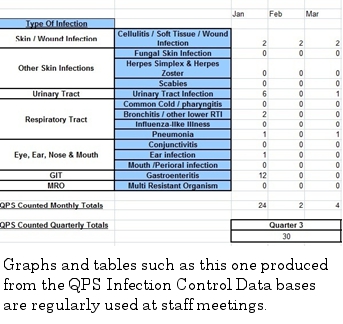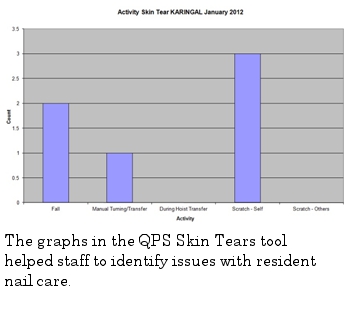Better Assessment, QPS data base tools and continual improvement go hand in hand at Karingal
Better Assessment, QPS data base tools and continual improvement go hand in hand at Karingal
Karingal is an 80 bed aged care facility at Dalby in the Darling Downs Region of Queensland. It is operated by Queensland Health and has been benchmarking with QPS Benchmarking for nearly two years. Dalby has a population of 16,000 and a wider catchment population of approximately 30,000.Nursing Director, Anita Bolton started work at Karingal in October 2010. Prior to that, Anita worked for a not for profit aged care facility in Tasmania. Anita had some experience with QPS Benchmarking in Tasmania, and therefore had firsthand knowledge on expected outcomes from outside the Queensland Health system.
As one of just two aged care facilities in Dalby, Karingal takes the high care residents for the catchment area, plus a number of low care residents as bed vacancies permit. The only other facility in town provides predominantly lower care services. With this resident mix, Karingal is similar to those ageing in place facilities that have a mixture of residents but are still predominantly high care.
With experience in the not for profit sector, Anita considered that the average resident income of just $70 per day indicated that the needs of the residents were potentially being under assessed. She also noted comments in her benchmarking report from the Principal Consultant about the gap between the ACFI results and the fact that management had indicated that the facility was high care when it first entered the benchmarking program. That is, the ACFI results were not reflective of management's original description of the facility.
Resident Assessment
Improvement of resident assessment occurred through three steps.
Step 1 - the recruitment of a clinical nurse consultant (CNC) with skills in resident assessment.
Step 2 - the CNC provided education to all staff. Anita herself provided education on the use of the QPS ACFI tool so that staff could see at a glance the outcomes of assessment.
Step 3 - A weekly meeting for key staff. The main purpose of this meeting was to review all residents, to look for obvious gaps in assessment, and to identify where the domain scores appeared out of align e.g. extremely high ADL score and a very low complex needs score. The non expected scores all pointed towards opportunities to better identify the true needs of the resident and to provide better care. Identified gaps were fixed immediately.
This process has now been developed to a point where the data in the QPS ACFI tool is linked to the Medicare Review dates. Priorities for review are assigned to residents with the greatest potential for change. The potential for change is based on regular feedback by staff on the condition of the resident. Whilst the modest and necessary increase in resident revenue is welcomed, the greatest benefit by far has been increased staff knowledge in respect of assessment. As one staff member says "how did we ever properly meet the needs of the residents when we did not formally recognise them? ACFI has been a revelation for our care model". Anita adds "the QPS ACFI tool is great; whenever we have our weekly staff meetings on resident assessment we have the summary data up on the big projector screen for everyone to see and to scrutinise". It is common place for someone to jump up and point to a particular domain rating and claim, "how can this be so?"
At first, staff members were hesitant to contribute input into these weekly meetings, but there has been a big shift in this culture. Staff members are now more open and transparent about their thoughts and concerns about the resident's needs. Discussion on how to both identify further needs and to address them is robust and challenging. Best of all, however, is the fact that staff members are more enthusiastic and demonstrate better insight into the needs of the residents. Along with this, staff morale appears to have improved.
Whilst the final proof of better assessment has been an increase in the overall average funding from a low $70 per day to now $110 per day, it is the benefits to resident care that excites Anita and the care staff at Karingal.
In past years, when referring to resident behaviour, it was common place for staff to say "don't worry, he is always like that"......the sort of comment that submerges rather than brings to the surface, the underlying problem. In one recent example, there was a resident with verbal behaviour issues that was creating anxiety for staff, other residents and families. Rather than accept the behaviour, a family conference was held and a better understanding of the resident achieved. Key words and phrases were identified that tended to settle the resident down. These key words and phrases were trialled and then recorded on the care plan. Through their continual use it has been observed that the resident is much easier to settle down. The change in culture resulting from a better understanding of ACFI and the diagnosis of resident needs has meant that staff members have become less accepting of "what is" and more open to "what could or should be". The team at Karingal has grown into this new way of thinking and in the weekly meetings it is now rare for anyone to refer to a resident's condition in a way that suggests little or nothing can or should be done. In essence this has been the dawning of a new, more challenging and exciting era of care.
Data is collected and reported on a range of the QPS data bases found in the Resources Library. This has helped to provide the necessary break down data for analysis and the development of improvement strategies. The QPS data bases are easy to use and the reporting functions are designed specifically for the management of aged care facilities.
Aggressive Episodes
Benefits are also reflected in the reporting of resident aggression. Over the past four quarters it has been noticeable that staff members have worked hard on recognising the "trigger points" for aggressive episodes. As aggression has reduced, staff have reported that Karingal is becoming an increasingly better place to work.
As a result of the improved breakdown of information and analysis, it was noted that most of the aggression was grouped into the 'sundowner' period of 1-5 pm. Utilizing the increased funding from improved assessment, a 12-6 shift was implemented. The process of better assessment, better analysis and effective improvement strategies has further convinced staff of the benefits of closing out the quality cycle using the benchmarking tools and report results. These improvements have also been observed by some neighbouring Queensland Health facilities and this had led to a request for the QPS Principal Consultant and Anita Bolton from Karingal to provide more education on the better use of the QPS tools and systems. Anita and the staff at Karingal are more than happy to share their improved practice with their sister facilities in Queensland Health and some teleconference workshops with some nearby facilities has already been arranged ......"we are now completing the definition of benchmarking by sharing and comparing our improved practices with others", adds Anita.
Use of the QPS Aggressive Episodes data base revealed a substantial amount of aggressive behaviour and incidents occurred in the least supervised outdoor area, particularly when staff tried to redirect residents back inside the building. Creative thinking on the part of the staff led to the door to the area being painted to look like a book shelf. This has diverted the high level dementia residents to another outside area where there is increased staff supervision and as a result the number of aggressive incidents has reduced - a simple, creative and effective solution. Whilst the solution was creative, it was the data analysis that revealed the problem.
Pain Management
In another recent anecdote, staff members through increased awareness, recognised that a resident who likes to wander a lot was becoming increasingly agitated during the 'sundowner' period. In years gone by this might have been considered 'the norm' for this time of day. The experience gained from a better understanding of assessment led to the suspicion that the resident was in pain. The resident was reassessed via the pain chart and the outcomes discussed with the attending Medical Officer. The timing of the resident's pain medication was changed from 5 pm to 2 pm and the change had the immediate impact of making the resident much happier right through to her normal bed time. She was pain free when she wanted to be up and walking about and her behaviour improved almost instantly. Anita says that better assessment is like a snowball gathering speed and momentum down the hill. "The more we identify the needs of the residents, the more problems we solve, the better our funding and we identify more opportunities for improvement. As the 'snowball' gets bigger and better we seem to enjoy our work more".
Urinary Tract Infections (UTI)
Investigation of data via the QPS Infection Incident Data base identified an elevated UTI rate that could not easily be explained. This, coupled with comments found in the QPS Principal Consultant's report, resulted in a clinical review of this information and a presentation to the Medication Advisory Committee. The committee is attended by a GP, pharmacist and 4-5 nurses. The outcomes were:
- The GP provided the staff with a flow chart and protocol for testing urine in aged care.
- The pharmacist increased education on UTI's in the elderly, including data on the use of antibiotics for the residents. This in turn led to Karingal joining the Anti-biotic Resistance Champions (ARC) group that advocates the need for reduced use of antibiotics.
- The QPS Infection Reporting Criteria has become an essential tool in the fight to reduce UTIs. Instead of solely relying on urine testing, clinical staff members are now using the reporting criteria to assist them to more proactively look for other more immediate symptoms. As soon as the symptoms are recognised the MO is consulted and a decision is then taken to order a MSU. Early detection of the symptoms and treatment is now having a positive impact on the UTI rate.


QPS Benchmarking has helped Karingal get up to (quality) speed. The results and the audits sometimes speak for themselves. They inform continuous improvement and this makes for wonderful evidence. In addition to this, Karingal received some very positive feedback from the Accreditation Assessors on its use of the QPS systems and tools, particularly the clinical data collection tools for KPIs such as infections, skin tears, aggression and falls. The assessors were impressed because there was clear evidence that Karingal was using the tools to not only monitor outcomes but to also better understand results and drive quality improvement.
0 comments